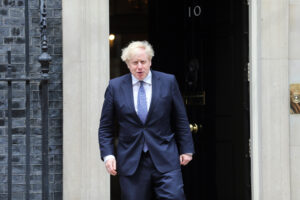Johnson set to announce £200 energy bill rebates to help against rising costs
Boris Johnson is poised to announce billions of pounds in state-backed loans to reduce the impact of soaring energy prices on household bills. Read more: Johnson set to announce £200 energy bill rebates to help against rising costs


Boris Johnson is poised to announce billions of pounds in state-backed loans to reduce the impact of soaring energy prices on household bills.
The prime minister and Rishi Sunak, the chancellor, have agreed to a “rebate and clawback” scheme, in which taxpayers will underwrite loans to energy firms.
Companies will pass the money on to every household in Britain in the form of a rebate on energy bills, limiting the impact of price rises in April.
The firms will recoup the money from consumers in subsequent years to pay back the loans as energy prices fall.
Government sources said the plans had been approved by ministers and would be announced in the coming days, possibly on Thursday.
Sources in the industry believe that the government may offer companies access to £6 billion in loans, equivalent to a rebate of £200 for every household.
Johnson and Sunak are also expected to announce more targeted measures for poorer households, including an extension of the warm homes discount. Council tax rebates and increased benefits have also been under consideration.
The energy price cap is forecast to rise by about 50 per cent to £2,000 a year on April 1, bringing bigger bills for 22 million households. Ofgem, the energy regulator, is expected to confirm the increase next week.
Johnson is attempting to refocus his premiership after the Metropolitan Police revealed that it was investigating 12 parties in Downing Street while Covid restrictions were in place. Conservative MPs have told him that he must address cost-of-living issues if he is to survive as prime minister.
He and Sunak agreed last Friday to proceed with plans to increase national insurance by 1.25 percentage points for employers and employees to clear NHS backlogs and overhaul social care. The tax rise is opposed by many Tory MPs, who have said that it will hit their constituents as they are struggling to cope with rising energy bills and inflation.
The Treasury has rejected calls from some MPs to cut VAT on fuel bills, which Sunak has said would cost £2 billion a year. Johnson had previously criticised such a cut as a “blunt” measure.
There are marked risks in the plan to loan energy companies money, which, in effect, spreads the cost of energy increases for consumers over several years. Energy analysts have warned that gas prices are likely to stay twice as high as normal until 2025.
Ministers have also been told that there will be record-breaking gas and petrol prices if Russia invades Ukraine. Senior government officials expect Russia to “weaponise” its natural resources and restrict supplies of gas to Europe if the West carries out its threat to impose sanctions.
Ministers believe that state intervention in energy costs is justified by the scale of the problem. A government source said: “This is not about propping up the balance sheets of energy companies. Every penny they get in loans will be passed on to consumers in the form of rebates.”
Last month the Resolution Foundation, a think tank, said that millions of families would be dragged into fuel poverty overnight if the government failed to intervene.
The foundation said that a quarter of households would suffer “fuel stress”, which means having to spend at least 10 per cent of family budgets on energy bills, the definition of fuel poverty in England. At present 9 per cent of households suffer fuel stress, but the figure will hit 27 per cent if the price cap rises by more than half.
Rocketing wholesale gas prices will make a large increase all but inevitable when Ofgem announces the new price cap on February 7. The government’s intervention will limit the increase, although households will still face a steep rise in their fuel bill.
The prime minister will also unveil a dozen “missions” to make people lead happier and longer lives. He is giving himself a decade to transform the country — in the face of calls by Conservative MPs for him to resign.
Under the plans the government will pledge to eliminate illiteracy and innumeracy in children leaving primary school by 2030, and to ensure 90 per cent of children meet national standards in maths and English.
Ministers will also promise to reduce the gap in life expectancy between the richest and poorest areas, raising overall healthy life expectancy — which measures the number of years people live in good health — by five years by 2035.
Read more:
Johnson set to announce £200 energy bill rebates to help against rising costs




















